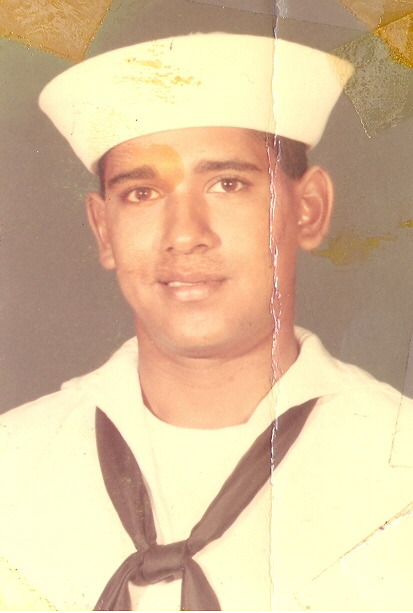TRANSCRIPTION
What was your life like before leaving to the sevice?
Well, just going to school and working a lot after school. I didn't really have that much time for extracurricular activities. Also I helped out my family with my sisters, so there wasn't a lot of time for fun.

Where did you work while in high school?
I worked at Royal Crown Bottling Company. I began working there when I was a junior and continued to work there till the end of my senior year. When I first started working there I unloaded the empty cola bottles. By the time, I was a senior I was already taking inventory of the bottles being shipped and loading the full bottles. I was slowly moving up the ladder.
Did you choose to enlist in the navy?
Well in a sense I was drafted into the army but enlisted in the navy before graduating. I joined the navy though because I felt by the joining the army I wouldn't return home from the war. I needed to return to my family but I also wanted to do my duty by serving my country. So I decided the navy would be the safest route for me to do both.
How was your boot camp experience?
In the beginning, it was scary not knowing what to expect. It was like the unexpected. Every day was different and it was weird being away from home. Sleeping with all my company members from all over the United States was interesting. I was bunking with guys from Washington, Colorado, Arizona, New Jersey, and Texas. It was very tough because I wasn't use to getting up at four in the morning and the whole company would march to the chow hall. The bad thing about being in a company was if the chow hall runner in our company would forget a certain duty. We has a whole would have to turn around and march all the back to bunk and then march to the chow hall till we got it right. Sometimes we had a short amount of time to eat, which wasn't pleasant. The good thing about boot camp was I was able to make friends with a good group of guys. I learned the different lifestyles of Americans, which was a good memory.

Even though you made friends was it hard leaving your family?
Yes, because I had never left Texas for such a long period of time. The longest trip I had ever made was to Alexandra, Louisiana with my best friend to visit his sister. His sister's husband was stationed in Louisiana. Being in California was a new experience and I felt lonely because I was so far away from home.
Can you express your thoughts you had when you were boarding the naval ship?
Well, the first ship I got on was the U.S. Midway Aircraft Carrier. When I got to the top of the dock I said to myself, "how is this going to stay on top of the water?" (laughs to himself) Being so heavy and what not. It was good being on an aircraft carrier because smaller ships experienced the worse weather at sea. Some stuffed were badly damaged because of the sharp waves.
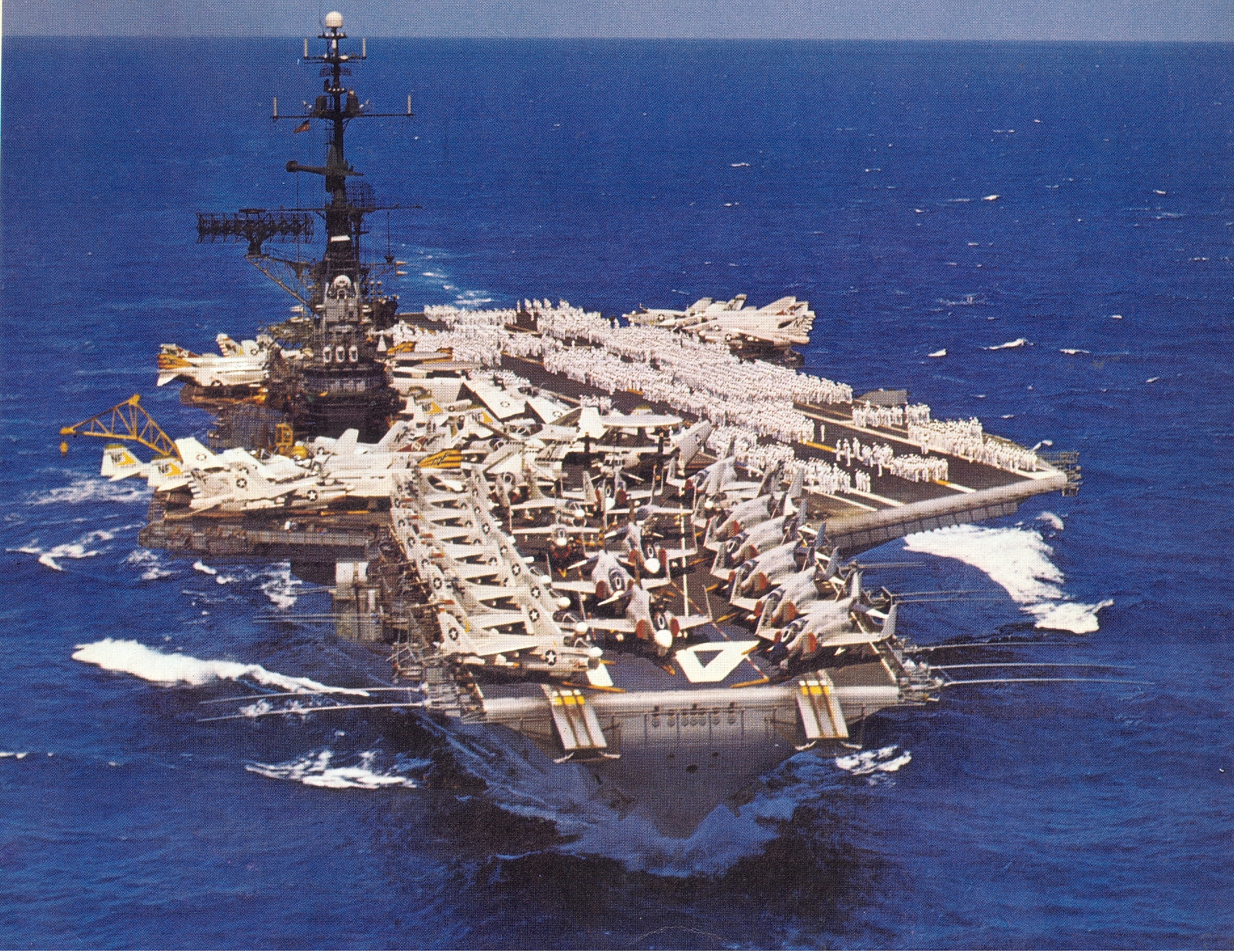
How would you describe life on the naval ship?
We had everything. A barbershop, a story to buy albums, razors, shaving cream, and other necessity item you might need. On Fridays was when we would have boxing matches and watch movies on the aircraft hangar. The ship was about three football fields long. I was really lucky to be on that ship, I really enjoyed myself.

What was your duty?
I was a postal clerk. I worked in the postal office selling stamps, money orders, and handed out mail for the mail call. Also I answered my shipmate's questions about parcels they wanted to send to their families.

What does the million dollar cake?
It signified dollar, it was the amount of dollars that the post office sold. The money mostly came from money orders and stamps. The largest denomination was a million dollars in money orders.
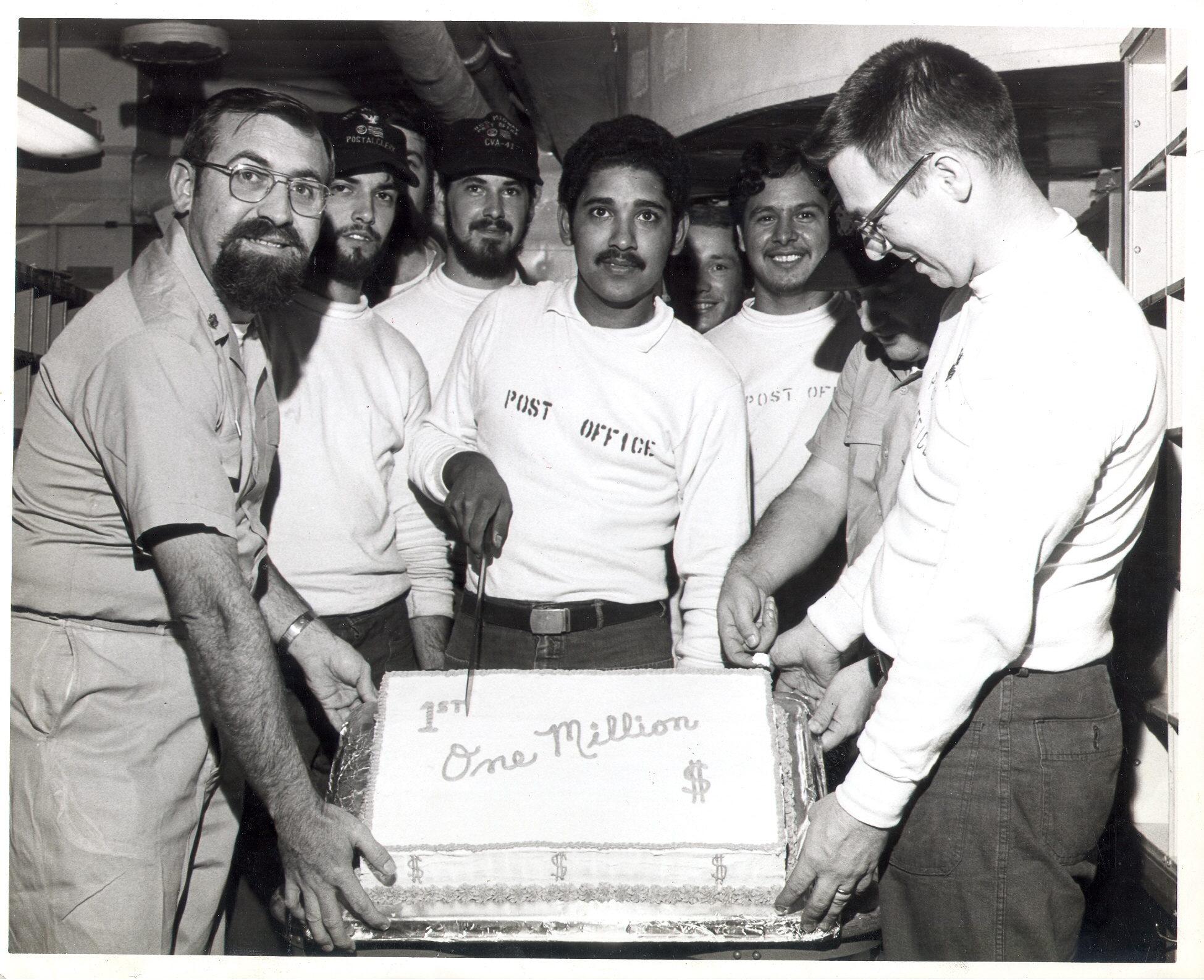
What part of Vietnam were you stationed?
Da Nag, Vietnam
What were some fears you had while approaching Vietnam?
That they would launch a missile from land at my ship. I mean we weren't close but still a rocket or missile could still hit us. When I delivered the mail I was scared because I flew in a small plane to land. All it had was to propellers and if it was hit we were sure to go down.
Can you describe the battlefield?
Well there was a lot of red sand out there. It was like driving in the country. The huts where the soldiers stayed were made of bamboo. The roof was made from palm tree leaves. On the battlefield, there were land mines and holes dug so that soldiers would fall and injury themselves. The guerillas would sometimes work on the base secretly and then at night come and shot the base up. As a soldier you were never able to tell who was a friend or foe.
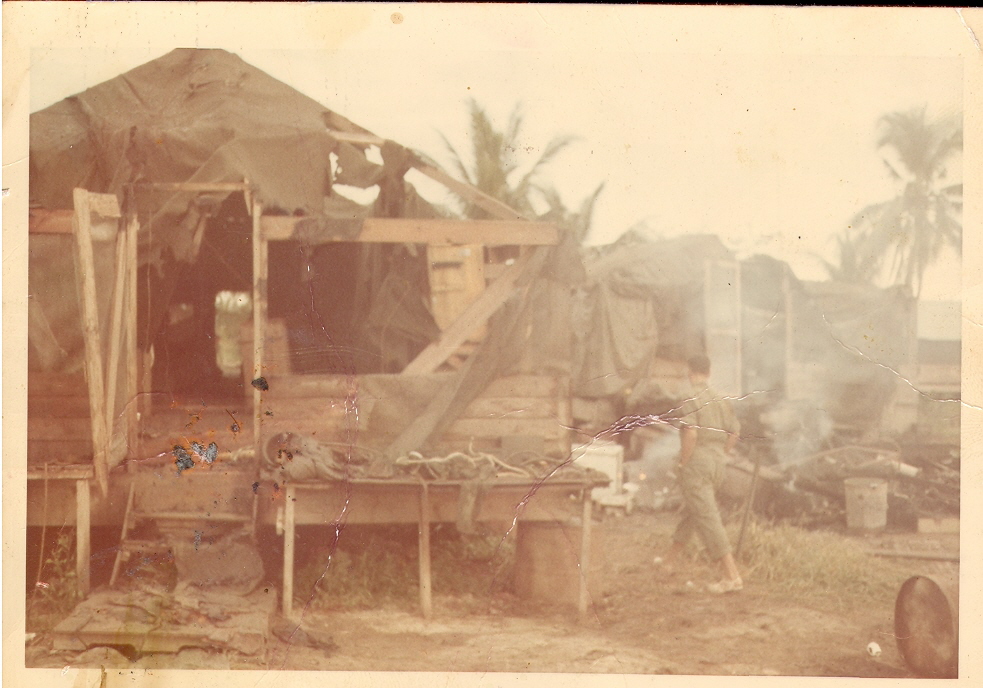
Is there something significant you witnessed that has never left your memory of the war?
I would have to say when I saw my fellow crewman die. He would recover the aircraft which meant he would refuel the plane. However, while he was fueling another plane was coming in to land and at this time a cable busted. The cable began to swing side to side and there was no controlling it. The aircraft then blew a tire causing it to crash into the stationed plan on the ship. The aircraft collided with the man fueling the stationed plane causing him to be pinned in between the two. The blood had be washed off the deck and his body was sent to the dispensary so that he could be flown to his family back home.
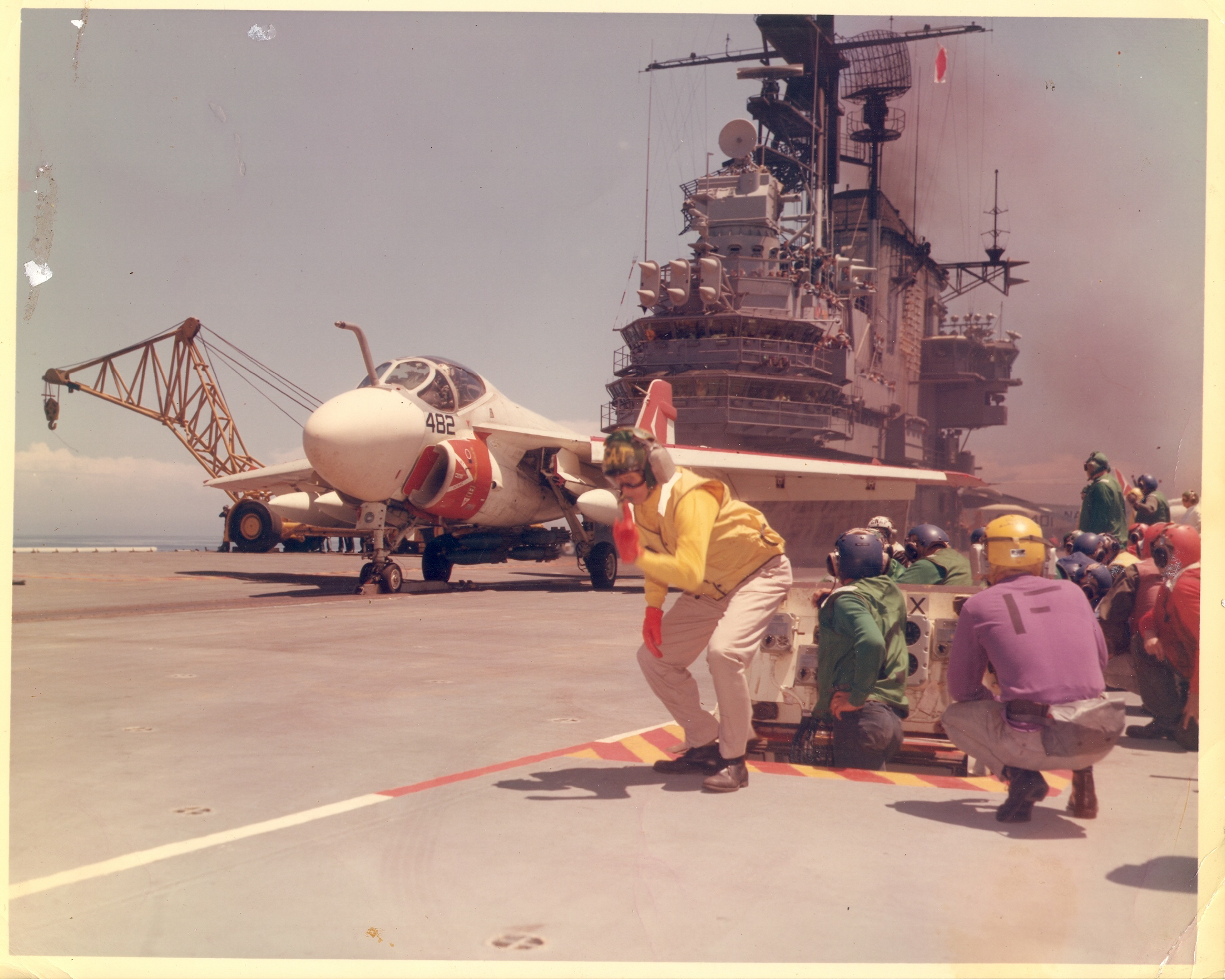
What is your worse memory of the war?
Worse memory was when your grandma and mom were with me in San Francisco. We were leaving as a family and then I got the worse news ever. Our ship was going to be shipped out and our family had to return home. I had to send them back to Texas after only spending 3 months with me. It was hard because my daughter was one year old and I wanted to experience her life with her. I felt I was missing out.
How long did you participate in the war?
Total participation was two years. It was a hard two years because you knew with every mission you participated in a lot of innocent people were involved. Also you never knew if you were coming home to your family.

After returning from the war, what did you do?
I took a mini-break and relaxed. I spent time with my wife and daughter. The break was cut short because I needed to find a job to support my family. Immediately I applied at numerous job sites. In reality, I got out of the service in March of 1973 and began working in May of 1973. It was nice not having to wake up at four in the morning or having someone yell at you. Actually on March the 3rd was my thirty-sixth anniversary of leaving the army.
How does work life and war compare?
Well, you always have to accomplish a mission. Whatever occupation you possess the purpose is to accomplish your goal. Work you can quit but the war you can't. Also you can go home after work and you have no choice to go home after a hard of day work when you're in the war.
If you did not enlist into the United States Navy, what do you think you would've done in life?
Well, I don't think college was in the future. I probably would've continued working at Royal Crown Cola Bottling Company and just moved up in the professional ladder. It was a good thing I joined though I was able to travel the western part of the world. I saw a lot and experience more than I could ever imagine.
How did the war impact your life?
It made you appreciate life a little more because it may not be the worse but you have to make everyday better than before. War is a wakeup call. Living in the United States is the best place to live. I feel people want to come to America because if you want something out of life it takes will power. There's plenty of that in the U.S.
Anything else you would like to add?
Military is a wonderful opportunity when you're young because so many doors can open for you. A better education, learning new skills, and meeting people from around the United States is what the military offers. I would recommend the military life to any young person who wants to better their life. The military teaches you skills that you can use for the rest of your life.
